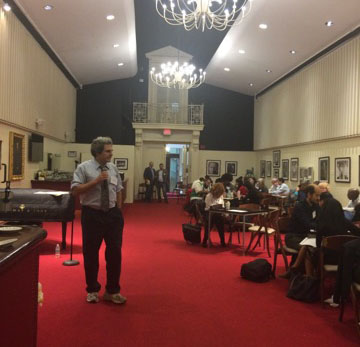The Massachusetts Cultural Council (MCC) and Klarman Family Foundation have launched a new program to help teaching artists improve the quality of their work with youth in schools and community settings across Massachusetts.
The Music Educators and Teaching Artists (META) Fellowship Pilot Program meets a growing need for high-quality, professional teaching in programs that employ the principles of creative youth development. With an initial focus on music, this two-year fellowship will help teaching artists develop the skills, relationships, and experiences they need to improve their practice. In turn, these artist educators will be better equipped to help their students grow as musicians and develop the cognitive and life skills they will need to thrive as adults.
“This project is a game changer. It is powerful and unique in a number of ways,” says Eric Booth, author and international authority on teaching artistry. “This can serve as a model for the rest of the country.”
Booth led learning sessions for more than 40 teaching artists on October 13 at the program’s launch at Boston’s Symphony Hall. They were joined by state Representative Alice Peisch of Wellesley, House Chair of the Joint Committee on Education, MCC Executive Director Anita Walker, and leaders of the Boston Symphony Orchestra, Boston Public Schools, and others.
MCC and Klarman will provide META Fellows with professional development in instructional practice, site visits, and access to a support network of more than 30 creative youth development organizations statewide. Fellows will also receive stipends of $800 annually for participating, and are eligible for grants up to $3,000 to further develop as teachers and artists. For their part, the META Fellows, with the support of their organizations, will participate in up to eight group learning sessions and visit two programs of other participating organizations each year. Finally they will develop and present projects that document new knowledge for broader dissemination within the represented organizations.
This pilot project builds on MCC’s 20-plus-year support of creative youth development, an intentional, holistic practice that fosters active creative expression through the arts, humanities, and sciences alongside core social, emotional, and life skills, for youth of all ages. In supportive spaces, with guidance from skilled and compassionate teachers, children and adolescents immerse themselves in creative endeavors: composing and making music, producing and directing films and journalism, writing and staging new dramas, creating and interpreting visual art. Programs take place in public, private and charter schools; nonprofit arts, science and history institutions; YMCAs, Boys & Girls Clubs, and many other settings.
Youth in these programs achieve high levels of artistic skill and a deeper knowledge of themselves and their cultural heritage. They build self-esteem, resilience, and civic agency. They create works of art and culture, and in doing so create meaning in their lives. The programs share an overarching goal to help them reach their full potential as individuals and as contributors to their communities.
MCC has been a national leader in this work for more than two decades. Its YouthReach Initiative integrates substantive out-of-school arts learning opportunities into a collaborative community response to the needs of young people – especially at-risk youth. More than 40 YouthReach programs have been honored over the years with National Arts & Humanities Youth Program awards from the President’s Committee on the Arts and Humanities. In 2014, MCC hosted the National Summit on Creative Youth Development, which shone a national spotlight on the work of YouthReach and generated an ongoing national partnership between the MCC, the National Guild for Community Arts Education, the President’s Committee on the Arts and Humanities, and Americans for the Arts. Later that year Massachusetts became the first state in nation to create a public support system for El Sistema-inspired work. SerHacer is an innovative program that provides grant support to programs, supports an instrument library through the Johnson String Project so that young people have access to high quality instruments with insurance and maintenance included, and includes a three year research study that seeks to establish the impact of the El Sistema model on the lives of young people.

